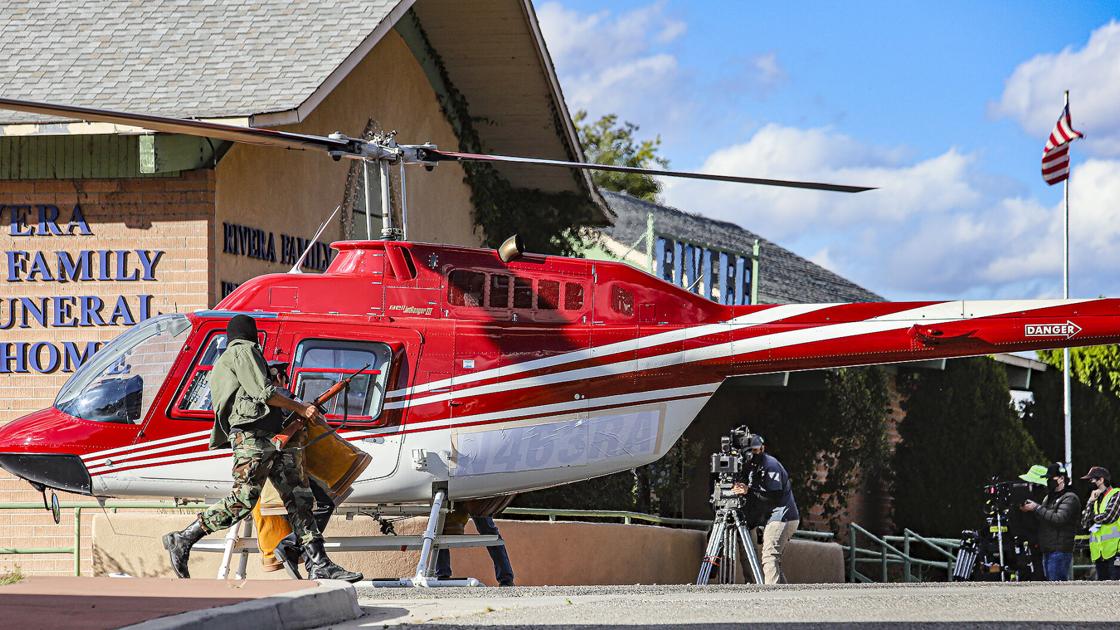
Liz Pecos didn’t have to spend Sunday afternoon making strike signs after all.
Instead, the head of the local behind-the-scenes film workers union is celebrating. After days of negotiations, representatives from the International Alliance of Theatrical Stage Employees and the film business agreed late Saturday to a three-year contract that puts an end to any talk of an industry-crippling strike.
In New Mexico, a hub for filmmaking, that means business will continue as usual, said Pecos, president of New Mexico’s chapter of the stage employees alliance, Santa Fe-based IATSE Local 480.
“We will not be striking tomorrow [Monday] and not hitting the picket lines tomorrow,’ she said by phone Sunday. “All strike prep has been called off.”
The film workers still must vote to approve the deal, which focuses on the Hollywood-based unions, while union officials will begin bargaining a second agreement for the other unions around the country, including New Mexico, Pecos said.
She said those bargaining agreements should start this week. In the interim, the union agreed to “call off” the strike with the understanding that the Alliance of Motion Picture and Television Producers, with which the union is dealing, will negotiate in good faith, she said.
She and members of her union had planned to meet in Albuquerque on Sunday to make strike signs and lay out a strategy for striking come Monday. The strike would have been immediate Monday and pretty much would have shut down the entire film and television industry, among other media businesses.
The union represents cinematographers, carpenters, prop makers, set designers and hair and makeup artists, among other trades, all of whom are often referred to as below-the-line talent. Union officials argued that the current contract forced workers to put in excessive hours and get little break or rest time, depleting their energy and morale. Pecos said there are about 2,000 workers in the state’s IATSE union.
Claudio Ruben, manager of Garson Studios on the Santa Fe midtown campus, wrote in an email Sunday that the studio was happy to hear “the strike has been called off.
“It would be ideal for this improvement of working conditions to now be mirrored throughout all film unions and guilds, both below and above the line. The industry pushes producers, production managers and assistant directors into unhealthy work conditions as much as it pushes other above and below-the-line workers. Some of these above the line positions can easily work 14-16+ hrs/day during filming. We’re just telling stories. No crew member or artist’s health and safety should be on the line.”
Octavio Marin, vice president in charge of production and operations at Santa Fe Studios, said by phone Sunday that the studio was “confident things would work out. This is a thriving industry, and we believe crews enjoy working in these mediums.
“We’re very happy to be moving forward, especially since we are working on the fourth season of Roswell, New Mexico — and a lot of other productions are knocking at the door.”
The strike would have affected seven film productions currently are shooting in New Mexico, according to the New Mexico Film Office. On Friday, when the strike looked likely, film office spokeswoman Jennifer Esquivel wrote in an email that it would have had a “significant impact on jobs and production spend.”
Movies have long meant big money in New Mexico. Former state governor Gary Johnson, then a Republican, kicked off a still-popular film incentive program to attract filmmakers in the 1990s. Subsequent governors have made those incentives more and more lucrative in an effort to make New Mexico a hot spot for filmmaking.
Among other benefits, now filmmakers can qualify for 25 percent tax rebates on qualified expenses for projects shot in New Mexico. Television production companies that bring long-term series to the state can receive rebates of 30 percent.
Critics say the incentives are not worth the investment, saying, at best, the state is lucky to breakeven on the deal. But advocates say internal state studies prove the incentives pay off.
In July, the State Film office reported the film industry brought in a record $623 million in direct spending during the 2021 fiscal year, despite closures and restrictions brought on by the pandemic.
Local 480 members are working on 11 television and film productions in New Mexico, including the fourth season of Roswell, New Mexico, at Santa Fe Studios. Two Westerns — Rust and Outlaw Land — are filming in the state as well, as is the Netflix film Chupa.
Netflix, NBCUniversal and other major film production operations have helped grow New Mexico’s film business, and the state’s landscapes have doubled for a large number of locations, from Wyoming to the Middle East, over the years.
This year, MovieMaker magazine named Albuquerque the best city in the country for filmmakers to live and work in. That report also named Santa Fe as the second-best small town for filmmakers to live and work in.
International Alliance of Theatrical Stage Employees International President Matthew Loeb told the Associated Press on Saturday, “This is a Hollywood ending. Our workers stood firm.”
Pecos said the show of collective strength among union members around the country proved “we are serious about receiving a fair contract, a fair deal.”
She said she did not think the union was taken seriously before the threatened strike.
“We were prepared to take action,” she said.
"strike" - Google News
October 18, 2021 at 09:00AM
https://ift.tt/30FIR81
Film and television strike averted; crews will work - Santa Fe New Mexican
"strike" - Google News
https://ift.tt/2WheuPk
https://ift.tt/2VWImBB
Bagikan Berita Ini














0 Response to "Film and television strike averted; crews will work - Santa Fe New Mexican"
Post a Comment